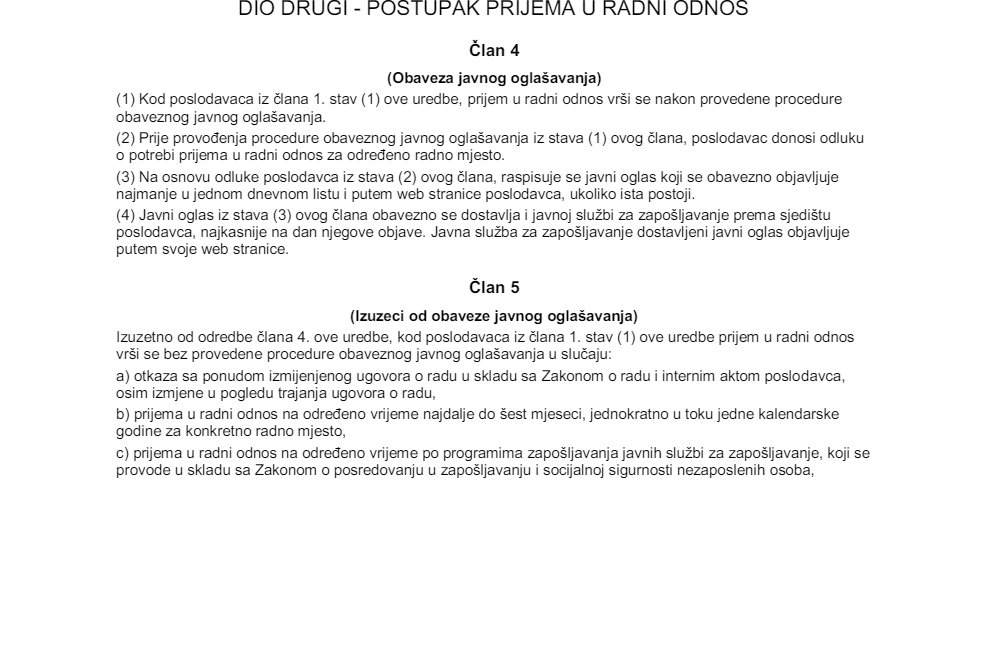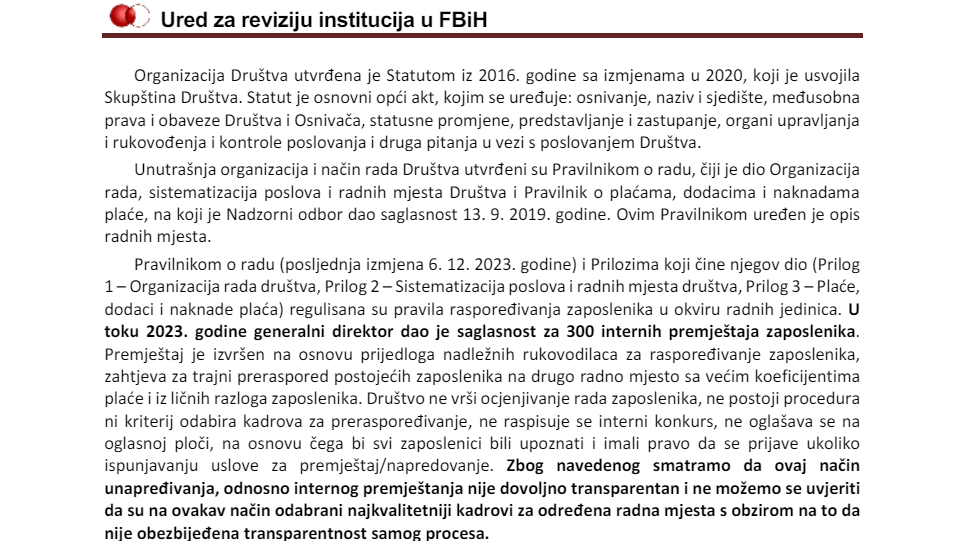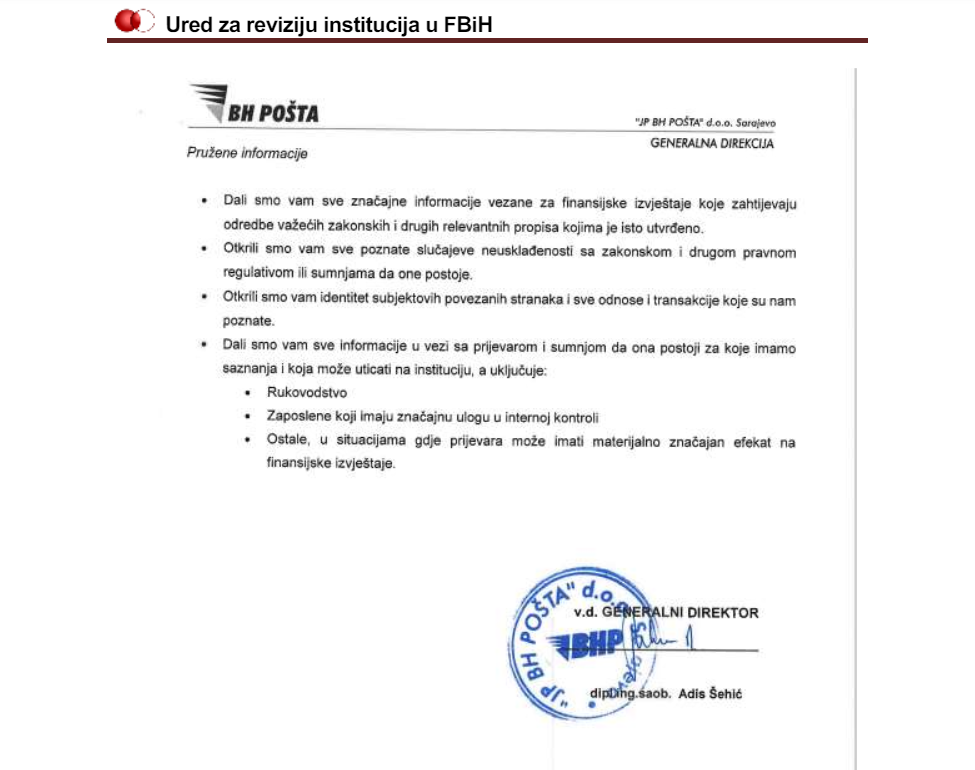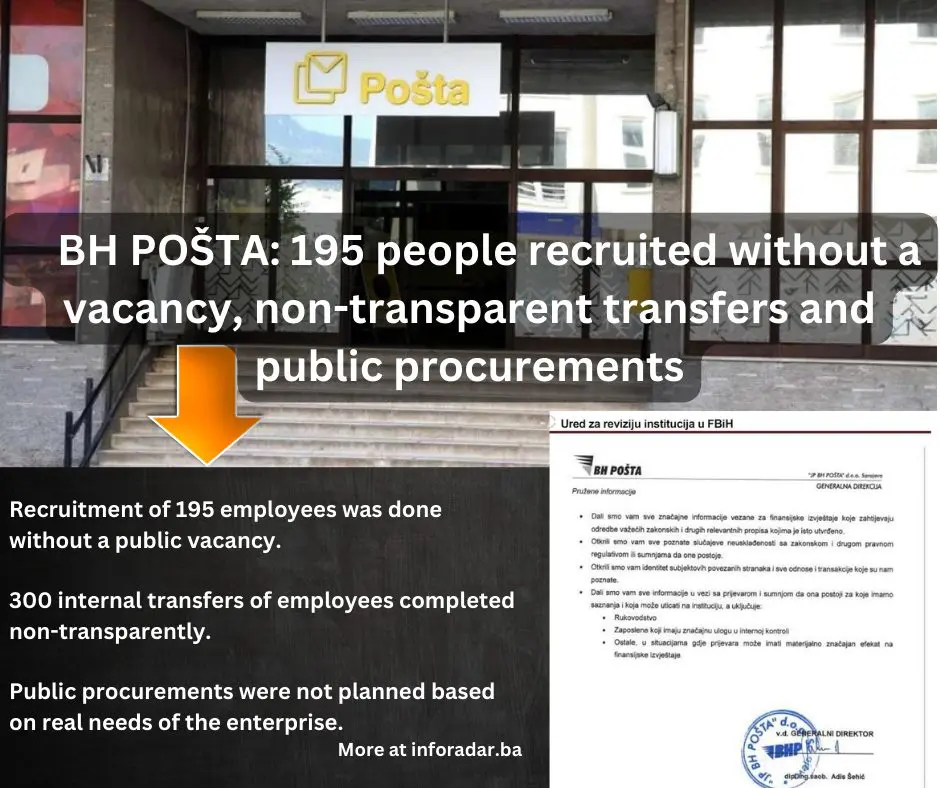The recruitment of 195 employees over the last year in the Public enterprise BH Pošta (BH Post) d.o.o. Sarajevo was conducted without announcement of a public vacancy. Although the Regulation on the Procedure for Employment in the Public Sector in the Federation of Bosnia and Herzegovina was applied during the recruitment process, the conditions of the Regulation were not met since the employees were hired for a fixed period and throughout the year.
The Federation auditors detailed the questionable employment practices in this enterprise in their latest report on the financial audit of PE BH Pošta d.o.o. Sarajevo for 2023. They explained that these were classified positions for which a public vacancy should have been advertised. Consequently, the transparency required during recruitment, in accordance with the Labor Law, was not upheld.
The enterprise stated that this method of employment was applied to ensure the smooth operation of each sector and to meet the obligations of providing services to the users due to the increased volume of work and the growing number of postal service users. However, the auditors did not accept this explanation, noting that “after the expiration of the statutory deadline of six-months, new contracts were concluded with the same individuals without any breaks or with short breaks between contracts (for the same or similar positions), which does not meet the condition of urgency”. They believe these are classified positions for which recruitment procedures should have been carried out through mandatory public vacancy.

A section of the Regulation on the Procedure for Employment in the Public Sector in the Federation of Bosnia and Herzegovina
– A total of 300 internal employee transfers were initiated during the past year at the proposal of the managers. However, auditors from the Audit Office of the Institutions in the FBiH noted that employees’ performance was not done; there were no procedures or criteria for selecting employees for transfer and no internal vacancy was announced based on which all employees would have been informed and given the opportunity to apply if they met the transfer/promotion criteria.
Although BH Pošta claimed it acted in accordance with the Rules of operations for internal transfers, the document submitted to the auditors “did not establish criteria for personnel selection, nor did it include an internal vacancy announcement to transparently inform all employees of promotion conditions”.
– For this reason we cannot confirm that the highest quality personnel were selected for each position, noted the auditors.
The approval for 300 internal transfers was granted by the then General Director Mirsad Mujić, who, during his tenure, was reported to the Prosecutor’s Office of Canton Sarajevo for malfeasance related to the award of tenders and falsification of documents.

Mujić granted approval for transfers /N1
Adis Šehić took over as the head of this public enterprise at the end of 2023, replacing Mujić. Just a few months ago, in his statements to the media, Šehić said that BH Pošta is “burdened with costs left behind by the former administration”. He stated that the enterprise had done 300 internal transfers and employed 200 new workers. Šehić pointed out that the internal transfers were done without any transparency.

Šehić warned of non-transparency /KLIX
– The crucial issue is that individuals obtained high-ranking positions at BH Pošta without by just knowing someone, presenting any diploma, and not necessarily having completed any internship. According to Šehić, some employees had two-three contracts within several months, receiving double salaries. Federation auditors confirmed this in their report, stating: “This method of promotion, namely internal transfer, lacks transparency and we cannot be assured that the best personnel were selected for these roles, given the lack of transparency in the process.”

A section from the Report of the FBiH Audit Office
Interestingly the auditors noted that this type of employment continued into the current year as well.
– Employees whose employment began under the Regulation in 2023 had their contracts terminated on December 30, 2023, only to be rehired under the same Regulation in early January 2024 with a break as short as five days (at least 44 employees without any change in job description). This practice is justified by the urgency of work performance, unforeseen increases in workload, and the need to cover employees on annual vacations and sick leave. However, considering that fixed-term employment occurred throughout the year, question arise regarding fulfilment of urgency criteria, particularly since these are classified positions for which recruitment procedures should have been conducted through mandatory public advertising, as it was clearly stated by the Federation auditors. The auditors concluded incentives totaling BAM 297.588 were paid to employees for regular tasks “without clearly established criteria and at maximum amounts” during 2023.
The audit also revealed that the public procurements were not planned based on real needs of the enterprise.
–The technical specifications for procuring the mentioned vehicles have established requirements that may be discriminatory and restrictive for competition since both maximum and minimum values were set for certain items, said the auditors who could not confirm “whether the enterprise conducted public procurement procedures amounting to at least BAM 1.797.260 in accordance with the Public Procurement Law concerning preparation of tender documents as to ensure equal treatment of all bidders, as well as monitoring the implementation of concluded contracts”.
By reviewing the documentation and provisions of the Agreement on the purchase and delivery of freight vehicles concluded on October 20, 2022 between the enterprise and the supplier Star – Centar d.o.o. Živinice, the auditors determined that there was a delay in the delivery of freight vehicles.
– The contract was not executed in accordance with Article 4, which stipulates that all vehicles should be delivered within 240 days from the signing of the contract by both parties. The commission minutes dated August 2, 202 indicated delivery of three Mercedes Benz Vito 114 CDI vehicles and six Mercedes Benz Citan 110 vehicles, worth BAM 508.500, thus violating the contract’s provision on timely delivery of all vehicles. According to Article 7 of the Contract, the supplier is liable to pay penalties of 0.5% of the undelivered goods’ worth for every seven days of delay in delivery. However, the Federation auditors found that penalties were not calculated in accordance with the terms stipulated in the signed contract.

Statement of BH Pošta’s management
The management of BH Pošta informed the auditors that they had “taken necessary measures to prevent fraud and abuse of public funds”.
They asserted that there had been no violation of active and fair competition, and emphasized that they had “identifiedall known instances of non-compliance with legal and regulatory requirements, or suspicions thereof.”
The Centers for Civil Initiatives, which advocate for transparency and equality in employment practices, said that they are expecting a response from Federation institutions—the Government of the Federation of Bosnia and Herzegovina, the Parliament, and the Commission responsible for audit at the FBiH Parliament.
– Our primary expectation is for the Commission to conduct hearings, to hear those responsible in the enterprise, and to order prompt elimination of these irregularities. We expect that all recommendations outlined in the auditors’ report will be swiftly implemented as to ensure transparent operations of the institutions and better provision of services to the citizens, said Alen Čular, CCI coordinator, for InfoRadar.
He added that it can be concluded that irregularities are repeated year after year in the majority of institutions subject to audit.
–The audit only scratches the surface with some institutions, often randomly, in relation to the analysis, and then you get to the report like the one of BH Pošta. Many irregularities go unnoticed by the public, particularly in institutions and enterprises that provide services to citizens, said Čular.







